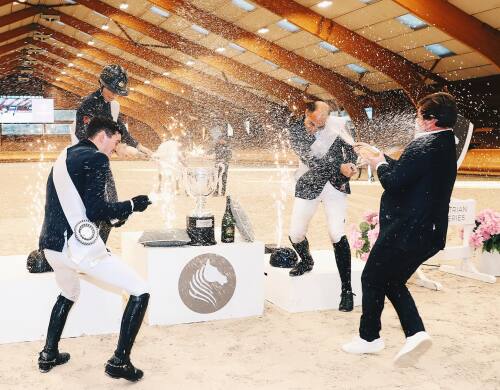New rules aimed at cleaning up welfare malpractices in endurance racing take effect on Aug. 1, but pressure is mounting in the French endurance community for even more to be done. A petition signed by more than 3,000 riders from Europe and North America has been sent to Princess Haya, president of the Fédération Equestre Internationale, while the Association Francaise des Veterinaires des Equestre Endurance (French endurance veterinarians) has written to the French Equestrian Federation expressing growing concern about failure to observe even existing FEI rules. The French federation first lobbied the FEI in 2012 to clean up endurance, fearing a “major welfare scandal” on their home turf at the Alltech FEI World Equestrian Games. The endurance ride will take place on Aug. 28, just five weeks away. At the Compiegne CEI (France), a World Games qualifying ride in May, there were several scandals including the “thin horse” whose image went viral, a dead horse that was bought by the United Arab Emirates’ Sheikh Mohammed just two weeks before and ridden by a stranger, and unprecedented cases of dehydration. Compiegne was organised by the same team who will run the World Games ride at Sartilly. After the event finished, five veterinarians who officiated at Compiegne issued an open letter bemoaning the state of the sport. One of the signatories was Jean-Louis Leclerc, a member of the Endurance Strategic Planning Group whose proposals were enshrined in the new rules. The petition was initiated by French rider-breeder Jean-Louis Tosque. His further suggestions to Princess Haya are based on concerns arising from incidents during the current European season, in which Middle Eastern teams have been participating. Among other proposals, Toque seeks return to the rule that horses competing in two-star races may only leave the venue the day after the competition with veterinary agreement; more authority for judges to prevent horses with low body condition scores competing; more efficient anti-doping measures to “counter the actions of those who have access to drugs not yet tested for; ” random testing at training yards; limits on how many rides horse can contest per year and monitoring of their destination post-competition; and an urgent review of penalties for repeat offenders. He added: “Endurance is currently being endangered by the practices that have recentlybeen outlined by various federations and numerous individuals. These practices are getting worse over time and have begun to expand into the European competitions.” He also warned that riders will become more vigilant and may “take actions to succeed.” On behalf of the French veterinarians, Association president Michael Payan flagged-up the growing practice of failing to offer horses water, despite the FEI rule it should be available every six miles. In the Middle East, rides are conducted over prepared “pistes” with an accompanying entourage of vehicles from which “mobile crewing” take place, with water poured over horses while they remain on the move—against FEI rules but condoned for years. Payan was concerned this practice had been seen in European rides as an alternative to offering a drink and contributed to the higher incidence of dehydration seen by veterinarians. The practice is all the more hazardous as most European rides take place in public open spaces and roads, where “mobile crewing” is neither feasible or safe.



